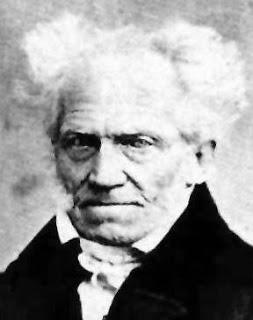
I recently read some of Arthur Schopenhauer's work. He was a first-rate aphorist who, unfortunately, diluted his pithy wisdom with mediocre metaphysics (a sentiment shared by Isaiah Berlin).
Here's some of George Carlin's wisdom: 'Inside every cynical person, there is a disappointed idealist.' No one more clearly epitomizes this truth than Schopenhauer. He was 'cynical' in the everyday sense of that term (as opposed to the technical, philosophical sense). Schopenhauer's cynicism was an aspect of his pessimism. He held out no great hope for humankind, which is one reason why he recommended resignation and renunciation -- resign yourself to our collective failure to advance morally beyond our predecessors, resign yourself to the fact that romantic love is generally a cruel joke, etc. etc. and, accordingly, renounce your worldly hopes. Such world-denying pessimism must be grounded in idealism (Carlin's point), for only against the backdrop of very high, ideal standards can such a sweeping condemnation of worldly endeavour make sense. And Schopenhauer was an idealist with a vengeance. He damned the chilly shadow-land of history as forever farcical and, shunning it, sought the perfect luminescence of Plato's ideal forms. Since he eschewed any divine agent of vengeance, Schopenhauer took its expression upon himself. From this bitter fount flew his cutting aphorisms.
Schopenhauer set his idealism in a metaphysical nightmare. He tried to bring together Kant's noumenon, the Platonic forms, and the will ... oops (cue the Beethoven) ... the WILL. A volatile mixture, to be sure -- I just hope he had good insurance. Somehow, the really real is supposed to be noumenal (hence beyond time and plurality) and ideal in Plato's sense (also beyond time but apparently plural despite the Form of the Good's best efforts) and volitional (and thus essentially temporal). Moreover, for Schopenhauer, each person's deeds arise from her character. But character, for Schopenhauer, is noumenal, which puts it beyond the reach of causation and, indeed, beyond any application of the principle of sufficient reason. So how can anything 'arise' from it? Also, being noumenal, it admits of no plurality. But then how can there be several characters, each accounting for our diverse acts? Perhaps the really real was also beyond arithmetic. Ah well, whereof one cannot speak ....
Still, the metaphysical train wreck should not detract from Schopenhauer's accomplishment. He advanced good criticisms of Kant's ethics (and anticipated some of G. E. M. Anscombe's points) and developed our notion of the unconscious (along with Fichte and Schelling). No other second-rate philosopher (but first-rate aphorist) has had such a profound influence. Among those whom Schopenhauer influenced the most are Wagner, Wittgenstein, Borges, Burckhardt, Turgenev, Thomas Hardy, Joseph Conrad, Samuel Beckett, Richard Taylor, and Thomas Mann. (Mann wrote an adulatory piece about Schopenhauer in 1938.) And on and on. Nietzsche, Tolstoy, and Huysmans had intense Schopenhauer phases but eventually opted for more life-affirming views. And though he denied it, there has long been a suspicion that Freud must have read Schopenhauer earlier in his life. Finally, here's Albert Einstein in 1933 with one of my favorite Shopenhauer quotations:
I do not at all believe in human freedom in the philosophical sense…. Schopenhauer’s saying, ‘A man can do what he wants, but not will what he wants,’ has been a very real inspiration to me since my youth; it has been a continual consolation in the face of life’s hardships, my own and others’, and an unfailing wellspring of tolerance. This realization mercifully mitigates the easily paralyzing sense of responsibility and prevents us from taking ourselves and other people too seriously; it is conducive to a view of life which, in part, gives humor its due.Schopenhauer was one of the earlier western philosophers to take seriously an eastern philosophical tradition and he was among the first prominent intellectuals to take seriously the ethical status of animals. These advances, together with the list of luminaries who admired Schopenhauer, lead me to suspect that the above metaphysical objections may well derive from misunderstandings on my part.
